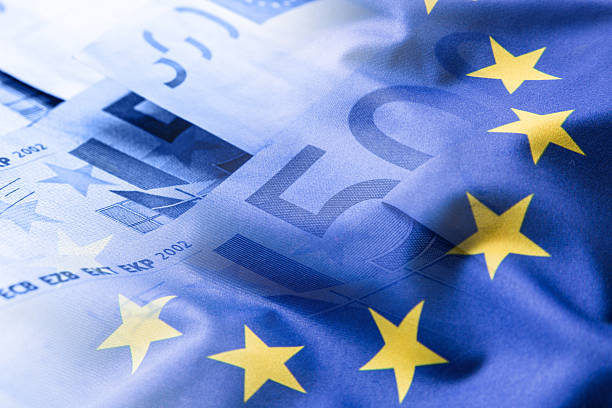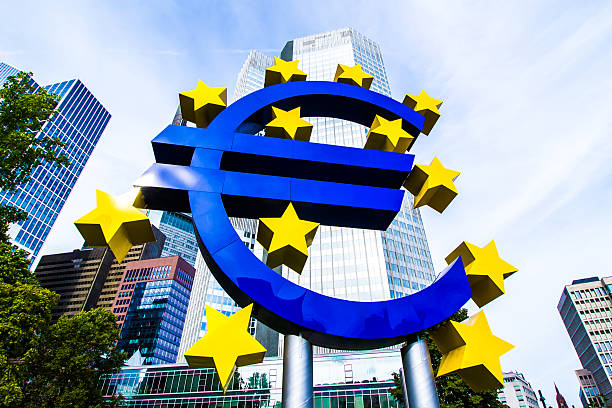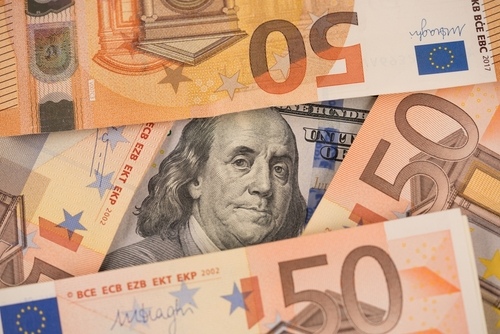EUR/USD strives to gain ground ahead of ECB Lagarde’s speech
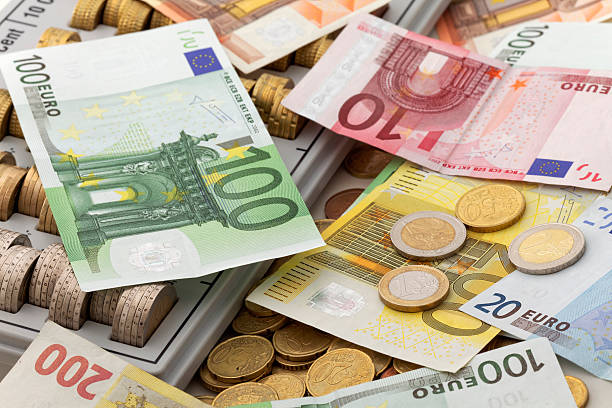
- EUR/USD consolidates above 1.0500 as investors look for fresh cues for Fed-ECB likely interest rate action in December.
- Fed’s Powell emphasized that there is no need to rush for rate cuts.
- Fears of a US-Eurozone trade war have escalated among investors.
EUR/USD trades sideways slightly above the psychological support of 1.0500 at the start of the week. The major currency pair consolidates as the US Dollar’s (USD) rally stalls after posting a fresh annual high. The US Dollar Index (DXY), which gauges Greenback’s value against six major currencies, looks for fresh triggers to extend its upside above the key resistance of 107.00.
According to analysts at Capital Economics, "While a period of consolidation looks likely in the near term, we have revised up our forecasts for the US Dollar and now project a further 5% appreciation by the end of 2025." Economists added, "That is based primarily on a view that President-elected Donald Trump will push ahead with the core tariff policies he proposed on the campaign trail and that the United States (US) economy will continue to outperform its major peers."
Investors are looking for fresh cues to know how Trump’s policies will guide the monetary policy action for the December meeting and 2025. Meanwhile, Federal Reserve (Fed) officials refrain from projecting the likely consequences of Trump’s policies on the economy and the interest rate policy. In the event at Federal Bank of Dallas on Thursday, Fed Chair Jerome Powell said, "I think it's too early to reach judgments here." Powell added, "We don't really know what policies will be put in place."
On the interest rate outlook, Jerome Powell said that the economy is not sending any signals that might force us to ramp up rate cuts, however, he reiterated that inflation is on a sustainable path towards the bank’s target of 2% that allows them to head towards the neutral rate.
This week, investors will focus on the preliminary S&P Global Purchasing Managers Index (PMI) data for November, which will be published on Thursday. The PMI data will show the current status of private business activity and the impact of Trump’s victory on business optimism.
Daily digest market movers: EUR/USD stays under pressure amid worries over likely Eurozone-US trade war
- EUR/USD trades sideways, with investors focusing on European Central Bank (ECB) President Christine Lagarde’s speech at an event in Paris scheduled at 18:30 GMT. Investors would like to know how much Trump’s protectionist policies will impact the Eurozone economy. Also, market participants would look for cues about the likely interest rate cut size in the December meeting.
- Fears of a trade war between the Eurozone and the United States have deepened after the commentary of Stephen Moore, a senior economist advisor to Donald Trump, who said at BBC radio over the weekend that the US would be less interested in a free trade deal with Britain if the government put its economic relations with the European Union (EU) ahead of those with the US, Reuters reported.
- The spark of a trade war between the Eurozone and the US arose when Trump mentioned, in his election campaign, that the euro bloc would "pay a big price" for not buying enough American exports.
- According to analysts at ING, the ECB is expected to cut interest rates again in December, but a 50 basis points (bps) cut is far from certain.
Technical Analysis: EUR/USD hovers around 1.0500
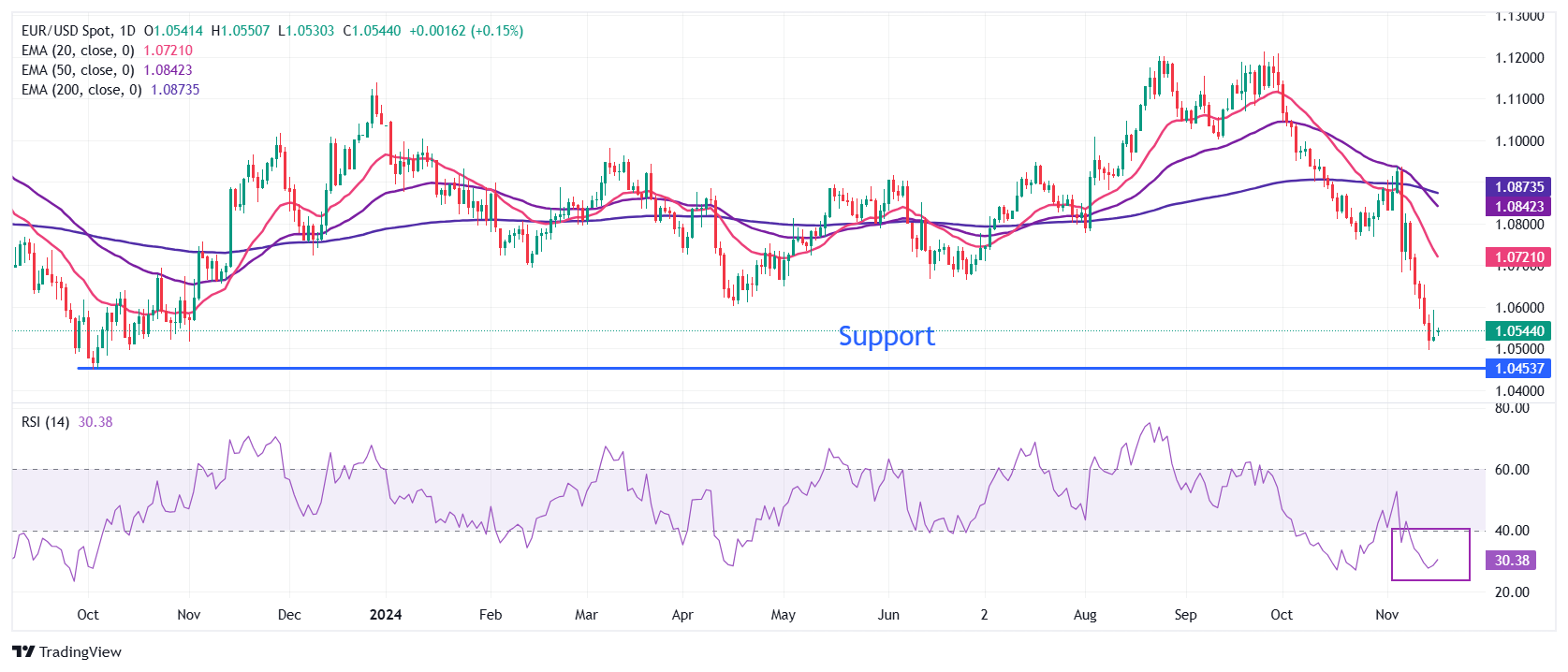
EUR/USD wobbles above the immediate support of 1.0500 in European trading hours on Monday. The outlook of the major currency pair remains bearish as all short- to long-term Exponential Moving Averages (EMAs) are declining.
The 14-day Relative Strength Index (RSI) oscillates in the bearish range of 20.00-40.00, adding to evidence of more weakness in the near term.
Looking down, the pair is expected to find a cushion near the October 2023 low at around 1.0450. On the flip side, the round-level resistance of 1.0600 will be the key barrier for the Euro bulls.
Euro FAQs
What is the Euro?
The Euro is the currency for the 19 European Union countries that belong to the Eurozone. It is the second most heavily traded currency in the world behind the US Dollar. In 2022, it accounted for 31% of all foreign exchange transactions, with an average daily turnover of over $2.2 trillion a day. EUR/USD is the most heavily traded currency pair in the world, accounting for an estimated 30% off all transactions, followed by EUR/JPY (4%), EUR/GBP (3%) and EUR/AUD (2%).
What is the ECB and how does it impact the Euro?
The European Central Bank (ECB) in Frankfurt, Germany, is the reserve bank for the Eurozone. The ECB sets interest rates and manages monetary policy. The ECB’s primary mandate is to maintain price stability, which means either controlling inflation or stimulating growth. Its primary tool is the raising or lowering of interest rates. Relatively high interest rates – or the expectation of higher rates – will usually benefit the Euro and vice versa. The ECB Governing Council makes monetary policy decisions at meetings held eight times a year. Decisions are made by heads of the Eurozone national banks and six permanent members, including the President of the ECB, Christine Lagarde.
How does inflation data impact the value of the Euro?
Eurozone inflation data, measured by the Harmonized Index of Consumer Prices (HICP), is an important econometric for the Euro. If inflation rises more than expected, especially if above the ECB’s 2% target, it obliges the ECB to raise interest rates to bring it back under control. Relatively high interest rates compared to its counterparts will usually benefit the Euro, as it makes the region more attractive as a place for global investors to park their money.
How does economic data influence the value of the Euro?
Data releases gauge the health of the economy and can impact on the Euro. Indicators such as GDP, Manufacturing and Services PMIs, employment, and consumer sentiment surveys can all influence the direction of the single currency. A strong economy is good for the Euro. Not only does it attract more foreign investment but it may encourage the ECB to put up interest rates, which will directly strengthen the Euro. Otherwise, if economic data is weak, the Euro is likely to fall. Economic data for the four largest economies in the euro area (Germany, France, Italy and Spain) are especially significant, as they account for 75% of the Eurozone’s economy.
How does the Trade Balance impact the Euro?
Another significant data release for the Euro is the Trade Balance. This indicator measures the difference between what a country earns from its exports and what it spends on imports over a given period. If a country produces highly sought after exports then its currency will gain in value purely from the extra demand created from foreign buyers seeking to purchase these goods. Therefore, a positive net Trade Balance strengthens a currency and vice versa for a negative balance.



